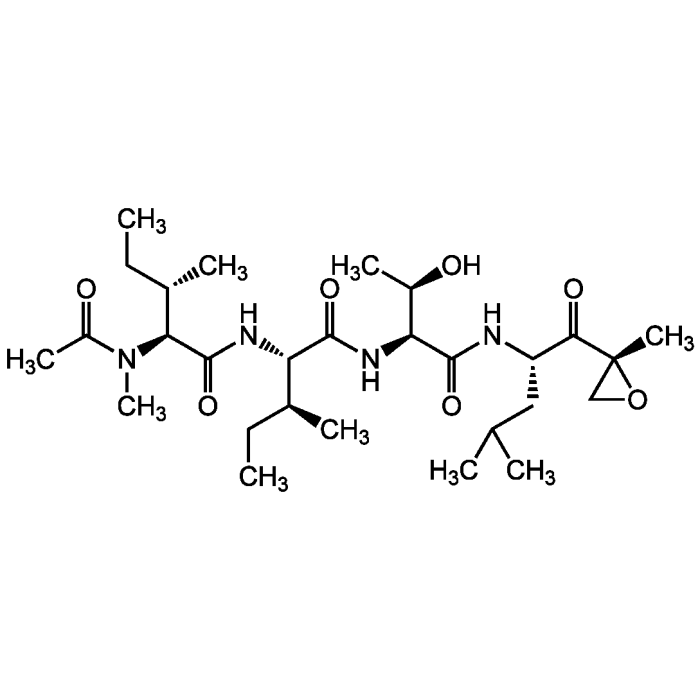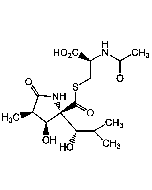Cookie Policy: This site uses cookies to improve your experience. You can find out more about our use of cookies in our Privacy Policy. By continuing to browse this site you agree to our use of cookies.
AdipoGen Life Sciences
Epoxomicin
As low as
90
CHF
CHF 90.00
In stock
Only %1 left
AG-CN2-0422-C05050 µgCHF 90.00
AG-CN2-0422-C100100 µgCHF 150.00
AG-CN2-0422-C250250 µgCHF 290.00
AG-CN2-0422-C500500 µgCHF 450.00

| Product Details | |
|---|---|
| Synonyms | Antibiotic BU 4061T |
| Product Type | Chemical |
| Properties | |
| Formula |
C28H50N4O7 |
| MW | 554.7 |
| Merck Index | 14: 3630 |
| CAS | 134381-21-8 |
| Source/Host Chemicals | Synthetic. |
| Purity Chemicals | ≥97% (HPLC) |
| Appearance | White to off-white solid. |
| Solubility | Soluble in DMSO. Insoluble in water. |
| Identity | Determined by 1H-NMR. |
| InChi Key | DOGIDQKFVLKMLQ-JTHVHQAWSA-N |
| Smiles | CC[C@H](C)[C@H](NC(=O)[C@H]([C@@H](C)CC)N(C)C(C)=O)C(=O)N[C@@H]([C@@H](C)O)C(=O)N[C@@H](CC(C)C)C(=O)[C@@]1(C)CO1 |
| Shipping and Handling | |
| Shipping | AMBIENT |
| Short Term Storage | +4°C |
| Long Term Storage | -20°C |
| Handling Advice |
Keep cool and dry. Protect from light and moisture. |
| Use/Stability | Stable for at least 2 years after receipt when stored at -20°C. |
| Documents | |
| MSDS |
 Download PDF Download PDF |
| Product Specification Sheet | |
| Datasheet |
 Download PDF Download PDF |
Description
- Antibiotic [1].
- Potent anticancer compound [1, 7].
- Cell permeable, potent, selective and irreversible 20S proteasome inhibitor. Predominantly inhibits the chymotrypsin-like (CTRL) activity of the proteasome. Exhibits lower level inhibition of proteasome trypsin-like and caspase-like activitives (100 and 1,000-fold slower rates respectively) [2, 3].
- Anti-inflammatory [4].
- Antimicrobial and antimalarial [8].
- Anti-parasitic [9].
- Stimulates bone formation by inhibiting osteoblast proteasome activity [5].
- Induces Parkinson's-like symptoms in rats [6].
- The ubiquitin-proteasome system (UPS) and autophagy serve as two complementary, reciprocally regulated protein degradation systems. Blockade of UPS by Epoxomicin activates autophagy.
- Blocks the Thymoproteasome β5t subunit activity.
Product References
- Epoxomicin, a new antitumor agent of microbial origin: M. Hanada, et al.; J. Antibiot. 45, 1746 (1992)
- Total synthesis of the potent proteasome inhibitor epoxomicin: a useful tool for understanding proteasome biology: N. Sin, et al.; Bioorg. Med. Chem. Lett. 9, 2283 (1999)
- Proteasome inhibition by the natural products epoxomicin and dihydroeponemycin: insights into specificity and potency: K.B. Kim, et al.; Bioorg. Med. Chem. Lett. 9, 3335 (1999)
- Epoxomicin, a potent and selective proteasome inhibitor, exhibits in vivo antiinflammatory activity: L. Meng, et al.; PNAS 96, 10403 (1999)
- Selective inhibitors of the osteoblast proteasome stimulate bone formation in vivo and in vitro: I.R. Garrett, et al.; J. Clin. Invest. 111, 1771 (2003)
- Systemic exposure to proteasome inhibitors causes a progressive model of Parkinson's disease: K.S. McNaught, et al.; Ann. Neurol. 56, 149 (2004)
- Establishment and some characteristics of epoxomicin (a proteasome inhibitor) resistant variants of the human squamous cell carcinoma cell line, A431: K. Ohkawa, et al.; Int. J. Oncol. 24, 425 (2004)
- The proteasome inhibitor epoxomicin has potent Plasmodium falciparum gametocytocidal activity: B. Czesny, et al.; Antimicrob. Agents Chemother. 53, 4080 (2009)
- Evaluation of the in vitro growth-inhibitory effect of epoxomicin on Babesia parasites: M. Aboulaila, et al.; Vet. Parasitol. 167, 19 (2010)
- Mechanisms of cross-talk between the ubiquitin-proteasome and autophagy-lysosome systems: V.I. Korolchuk, et al.; FEBS Lett. 584, 1393 (2010)
- Activity-Based Profiling Reveals Reactivity of the Murine Thymoproteasome-Specific Subunit β5t: B.I. Florea, et al.; Chem. Biol. 17, 795 (2010)






![Z-Leu-Leu-Leu-CHO [MG-132]](https://adipogen.com/media/catalog/product/cache/60eb5af712bc93baae8d55513bd31b01/a/g/ag-cp3-0011.png)
